⢠Breaking Free From Boundaries ⢠The Power of Pujas ... - Kechara
⢠Breaking Free From Boundaries ⢠The Power of Pujas ... - Kechara
⢠Breaking Free From Boundaries ⢠The Power of Pujas ... - Kechara
You also want an ePaper? Increase the reach of your titles
YUMPU automatically turns print PDFs into web optimized ePapers that Google loves.
<strong>The</strong> <strong>Kechara</strong> in-house quar<br />
terly newsle<br />
tter<br />
Jan 2012<br />
THINK BIG<br />
for non-muslims only<br />
• <strong>Breaking</strong> <strong>Free</strong> <strong>From</strong> <strong>Boundaries</strong><br />
• <strong>The</strong> <strong>Power</strong> <strong>of</strong> <strong>Pujas</strong><br />
• Extraordinary Ordination<br />
• Rinpoche’s Life Stories<br />
• Perusing <strong>The</strong> Paranormal<br />
• What Would It Take To Get You<br />
Out Of Your Comfort Zone?
Inside This Issue<br />
PAGE 4, TEACHING: H.E. Tsem Tulku Rinpoche explains why<br />
breaking through your personal boundaries is so important<br />
and why the rewards are worth the effort.<br />
PAGE 8<br />
PAGE 16<br />
Dear readers,<br />
<strong>The</strong>re’s that smell <strong>of</strong> new beginnings in the<br />
air! HAPPY NEW 2012 and here’s wishing<br />
you plenty <strong>of</strong> good stuff in the coming 12<br />
months!!<br />
This year at <strong>Kechara</strong>, we’re doing<br />
something different - we’re going far<br />
beyond the usual practice <strong>of</strong> making New<br />
Year resolutions. Forget the piddly little<br />
promises we make to ourselves to lose 5<br />
pounds, get a promotion or find Prince<br />
Charming. We’re going all out and crossing<br />
all boundaries: It’s time to THINK BIG. Go<br />
all the way with your aspirations, have big<br />
dreams (no matter how impossible they<br />
may feel) and then set out to achieve them<br />
before December rolls around again.<br />
In fact, we even ended the last year with<br />
a bang - things were already starting to<br />
GET BIG with the first-ever ordination <strong>of</strong><br />
Buddhist pastors. Yes, <strong>Kechara</strong>’s always<br />
one for breaking records and pioneering<br />
new horizons. Read all about the new<br />
pastors in this issue and discover how this<br />
historical ordination marks the beginning<br />
<strong>of</strong> great waves in through the Buddhist<br />
world in this region… perhaps even in the<br />
whole world!<br />
<strong>The</strong>re’s also a special focus on our<br />
temple and spiritual heart, <strong>Kechara</strong> House<br />
this issue - from pastors to pujas to the<br />
many people who make it what it is, we<br />
show you what it means to be a part <strong>of</strong> a<br />
dynamic, fun and wholly fulfilling spiritual<br />
family. Remember to keep THINKING BIG -<br />
the only thing holding you back is you.<br />
PAGE 6<br />
FEATURE: Learn more<br />
about the <strong>Power</strong> <strong>of</strong><br />
<strong>Pujas</strong> and how they<br />
can help in your<br />
everyday life.<br />
no more caves is brought to you by <strong>Kechara</strong> Buddhist organisation. For more information<br />
about <strong>Kechara</strong>, its departments and activities, please visit the websites below or contact<br />
<strong>Kechara</strong> House.<br />
<strong>Kechara</strong> House<br />
No. 7, Jalan PJU 1/3G,<br />
SunwayMas Commercial Centre,<br />
47301 Petaling Jaya,<br />
Selangor, MALAYSIA<br />
t: +603 7803 3908<br />
f: +603 7803 3108<br />
e: care@kechara.com<br />
w: www.kechara.com<br />
Spiritual Guide<br />
Tsem Tulku Rinpoche<br />
EVENT: Find out about<br />
<strong>Kechara</strong>’s historical<br />
Pastor Ordination that<br />
will bridge the gap<br />
between the Buddhist<br />
Sangha and everyone<br />
else.<br />
Managing Editor Jamie Khoo<br />
Editor<br />
Writers<br />
Photography<br />
SPEAK YOUR<br />
MIND: What would<br />
it take to get out <strong>of</strong><br />
your comfort zone?<br />
Our columnists<br />
speak out.<br />
Shantini Suntharajah<br />
Tenzin Losang<br />
Ngeow Su An<br />
Tenzin Khenchen<br />
Jamie Khoo<br />
Shantini Suntharajah<br />
e-division,<br />
<strong>Kechara</strong> InMotion,<br />
<strong>Kechara</strong> Soup Kitchen<br />
Peace,<br />
Jamie<br />
Blog<br />
Website<br />
Facebook<br />
Twitter<br />
YouTube<br />
blog.tsemtulku.com<br />
tsemtulku.com<br />
facebook.com/tsemtulku<br />
twitter.com/tsemtulku<br />
youtube.com/tsemtulku<br />
Designer<br />
Printed By<br />
Tac<br />
Imminent Enterprise
SPOTLIGHT<br />
ON<br />
KECHARA<br />
HOUSE<br />
<strong>From</strong> humble beginnings, <strong>Kechara</strong> House has pushed past all boundaries and limitations to<br />
become the organisation that was first visualised by H.E. Tsem Tulku Rinpoche.<br />
When we look at <strong>Kechara</strong> House today<br />
- the 13 departments affiliated with it<br />
and the growing workforce working<br />
within these departments - it is easy for<br />
us to forget how it all started in the first<br />
place. In the beginning, there were many<br />
trials and tribulations that the founding<br />
members had to face to make their Lama’s<br />
aspirations a reality.<br />
For the pioneer members <strong>of</strong> <strong>Kechara</strong>,<br />
there was no sprawling, large, airconditioned<br />
Gompa (prayer hall) with a<br />
seating capacity <strong>of</strong> 700 to use for pujas,<br />
events and Dharma classes. All they had<br />
then was a sincere motivation to practise<br />
and share Dharma, and the unwavering<br />
faith they had in H.E. Tsem Tulku Rinpoche<br />
and his grand vision in spreading the<br />
teachings <strong>of</strong> Lama Tsongkhapa.<br />
In the early days <strong>of</strong> the organisation,<br />
Kecharians held their own little prayer<br />
and Lamrim study sessions at their private<br />
residences. Under the advice <strong>of</strong> Rinpoche,<br />
these activities were held regularly to<br />
create the causes for an actual Dharma<br />
centre to manifest. Dato’ Ruby Khong’s<br />
home, in particular, became a regular venue<br />
for these activities in the late 90s. Things<br />
began to develop a little when Dato’ Ruby<br />
came up with the idea <strong>of</strong> renting a house<br />
and turning it into a Dharma house, in<br />
dedication to her late mother who had<br />
just passed on at that time. <strong>The</strong> new place<br />
was named “Tara House”, after the female<br />
Buddha Tara. Tara House was used as a<br />
venue for weekly gatherings and pujas<br />
and the occasional Dharma teaching by<br />
Rinpoche.<br />
Due to limited space and the fact that it<br />
was located in a residential area, activities<br />
at Tara House were never announced<br />
publicly and guests arrived only by<br />
invitation. Despite these restrictions,<br />
the crowd that visited Tara House was<br />
substantial enough to draw complaints<br />
from neighbours. It wasn’t long before<br />
Rinpoche expressed his wish for a larger,<br />
more appropriate space for Dharma<br />
activities to be held. So a hunt was set<br />
for a shoplot in Petaling Jaya that could<br />
be converted into a Dharma centre. It<br />
was some six months later that a suitable<br />
shoplot was identified at SunwayMas<br />
Commercial Centre and efforts to acquire<br />
it began. <strong>The</strong> pioneers faced numerous<br />
challenges including lack <strong>of</strong> funds and<br />
other uncertainties.<br />
But these difficulties were eventually<br />
ironed out and the first, <strong>of</strong>ficial <strong>Kechara</strong><br />
House was born. In 2007 another <strong>Kechara</strong><br />
House - aptly named KH 2 - was set up<br />
down the road. On 27 November 2010, a<br />
whole new chapter unfolded for <strong>Kechara</strong><br />
with the launch <strong>of</strong> its newer, larger and<br />
better-equipped Gompa (prayer hall),<br />
which is the central location for many<br />
<strong>Kechara</strong> activities.<br />
In just over a decade, <strong>Kechara</strong> House<br />
has grown into the organisation it is today<br />
with dozens <strong>of</strong> departments working<br />
toward spreading Dharma across the<br />
region. <strong>Kechara</strong> now has chapters in<br />
Penang, Pahang, Perak and Johor as well<br />
as in various major cities around the world<br />
such as in Singapore, Kathmandu, London,<br />
Bangkok and Shanghai.<br />
Japanese industrialist Soichiro Honda<br />
once said, “Success is 99 per cent failure.”<br />
<strong>The</strong> struggles and sacrifices <strong>of</strong> the pioneer<br />
members <strong>of</strong> <strong>Kechara</strong> House have proven<br />
that nothing is impossible when we truly<br />
believe in our goals. As testament to their<br />
effort and faith in their spiritual guide<br />
- <strong>Kechara</strong> House is today an important<br />
centre for Buddhist practice and study and<br />
continues to grow for the benefit <strong>of</strong> many.<br />
03
BREAKING<br />
AWAY FROM<br />
BOUNDARIES<br />
Getting past your comfort zone<br />
can be incredibly difficult and<br />
highly inconvenient but H.E.<br />
Tsem Tulku Rinpoche shows us<br />
that the pay<strong>of</strong>f is more than<br />
worth the effort.
I discovered that one <strong>of</strong> my students is very firm on becoming a<br />
Buddhist nun. This news is extra special because I know she had to<br />
overcome a major personal limitation - namely moving out <strong>of</strong> her<br />
parents’ home and living on her own - to reach this momentous and<br />
significant decision. She used to make never ending excuses for not<br />
finding time for Dharma, Dharma work, volunteering and such, yet<br />
now she is committed to dedicating her life to the Dharma. Let me<br />
tell you her story because I believe it is a wonderful example about<br />
the importance <strong>of</strong> breaking through our perceived limitations.<br />
Although mature, this student <strong>of</strong> mine lived at home. I mean if you<br />
are old enough to live on your own but you are still at home, using<br />
the facilities and enjoying all the extras like home-cooked meals,<br />
having someone else do the cleaning, laundry and paying the bills,<br />
then you clearly want an easy life. This may not appear to be a bad<br />
thing until you think about it further. Craving convenience without<br />
responsibility arises from wanting to stay in one’s comfort zone.<br />
If you live at home or choose to remain in any life situation<br />
merely because it is convenient, you will find that you never reach<br />
the heights <strong>of</strong> success or develop strength <strong>of</strong> character. Why? Well,<br />
because you are stuck on the fundamental attitude <strong>of</strong> purely wanting<br />
convenience and not taking responsibility for yourself. When that<br />
attitude is present, it will pervade everything you do and sooner or<br />
later, it will become a major stumbling block when you want to do<br />
more with your life.<br />
I know that my student (and others who stay at home like she did)<br />
may appear to have an easy life but they will suffer in various ways.<br />
For instance, they will have major problems with their finances.<br />
When we live at home, we will usually tend to blow our paychecks<br />
on indulgences and not necessities because we know our parents<br />
will pay for everything. We end up not learning the responsibility<br />
<strong>of</strong> paying bills, watching our spending, saving, donating towards<br />
Dharma (to collect merit) or investing in anything worthwhile. Most<br />
<strong>of</strong> the time, we use the money for our own fun. How much do we<br />
donate to Dharma, charities or others when we get our paycheck and<br />
the whole paycheck is just for us and spending at our convenience?<br />
We usually allocate a large part <strong>of</strong> our money for fun. This is a<br />
dangerous and frivolous thing to do because we will end up in a big<br />
mess when our parents are not around anymore.<br />
When she moved out, my student discovered that growing up<br />
means not having the conveniences <strong>of</strong> home but adjusting and<br />
finding the space and the freedom to explore and develop her mind.<br />
<strong>The</strong> dividend <strong>of</strong> living on her own is that she can grow, expand and<br />
learn how to use the tools for survival that she would have never<br />
have learned at home.<br />
This applies to other challenges in life as well, like starting a<br />
business, changing jobs, moving to another country or ending a<br />
relationship that is bad for you. You’ll find that you will have to pay<br />
more bills, have less to spend on yourself or maybe have very little<br />
time for yourself but these obstacles will make you perform better<br />
at work and in life.<br />
It is very important to look beyond how you are and who you are<br />
now and concentrate on where you will get to and what you can be<br />
in the future. This type <strong>of</strong> forward thinking is possible if you take it<br />
one day at a time.<br />
Never forget that failure will occur: you will try and you will fail<br />
but it is crucial that you get up, dust yourself <strong>of</strong>f and do it again.<br />
Only then will you succeed. Don’t feel down or disheartened<br />
because you have been unsuccessful many times. Remember, it<br />
is always better to try and fail than to do nothing and fail anyway<br />
by not accomplishing anything <strong>of</strong> value or significance in your<br />
life.<br />
When you try, you build yourself up for the next challenge<br />
because although you did not reach your goal, you gain priceless<br />
knowledge on how to do better the next time. This knowledge<br />
will work as an invaluable tool in your next attempt at attaining<br />
your goal.<br />
You need to understand that you will not succeed the moment<br />
you are on your own and you try to achieve something. Instead,<br />
you will have many, many anxieties and frustrations but if<br />
you want to know how to get rid <strong>of</strong> all these fearful emotions,<br />
I have the answer. It is simple but it requires persistence<br />
and determination on your part. Here it is: stop longing for<br />
conveniences and an easy, problem-free life!<br />
You must become independent and push past your limitations.<br />
If you don’t, you will look back at your life one day and wish<br />
you had done more or been better than you have been. You<br />
will realise with sorrow and regret that you didn’t accomplish<br />
anything because your fear limited you. Fear can only lead to<br />
more fear. It does not disappear just because you hide from<br />
it. Fear will leave you confined within its boundaries and it<br />
will leave you helplessly wishing and hoping to be more as<br />
you watch others go on to achieve great things in their lives.<br />
Meanwhile, you are left behind, with a small life and unfulfilled<br />
dreams. In the end, you will realise that being left behind is far<br />
worse than facing your fears, breaking through your mental and<br />
physical limitations and challenging yourself to do more than<br />
you think you can.<br />
<strong>The</strong> aim is to move beyond boundaries and to move up.<br />
Change your attitude, behaviour, dressing, appearance,<br />
performance, speech to impress and to be successful.<br />
Challenges will force you to transform yourself for the<br />
better. <strong>The</strong>re is no better teacher than the need to survive.<br />
You will find that by putting your comfort zones behind you,<br />
you will achieve much greater success, which ironically will<br />
bring true comfort to you! It pushes you - in a good way -<br />
to be all that you can be BECAUSE YOU HAVE NO CHOICE<br />
BUT TO MAKE IT.<br />
I am very happy for this student who has come such a long<br />
way from the complaining, whiny person she used to be. She<br />
is gaining independence from her own fears and her heavily<br />
guarded comfort zones. I am so happy for her and for anyone<br />
who successfully conquers his or her fears.<br />
Find yourself. Be with yourself. Fail and then achieve. <strong>The</strong>re’s<br />
so much more out there. Find your inner freedom by making<br />
changes from the outside. You can achieve. You can do it. You fail<br />
only when you don’t try and go all the way. <strong>The</strong>re’s really nothing<br />
to lose that you won’t lose anyway if you don’t do it!<br />
05
Are pujas merely religious<br />
rituals or do they mean<br />
something more? Tenzin<br />
Losang delves into the<br />
intricacies <strong>of</strong> this ancient<br />
THE POWER<br />
practice.<br />
PUJAS<br />
Anyone who is familiar with Tibetan<br />
Buddhism would have already heard <strong>of</strong><br />
pujas, witnessed one being performed or<br />
maybe even practised one or two on a daily<br />
basis. But what are pujas, exactly? <strong>The</strong>y<br />
appear to be mystical rituals with exotic<br />
mantras, gestures and implements but<br />
what do they mean on a deeper level?<br />
<strong>The</strong> word puja means “praise” in<br />
Sanskrit. <strong>The</strong> practice <strong>of</strong> pujas exists not<br />
only in Buddhism but in various other<br />
religions as well. As a ritual, pujas are<br />
basically the display <strong>of</strong> reverence and a<br />
practice <strong>of</strong> making <strong>of</strong>ferings on a physical<br />
and mental level to enlightened Beings<br />
by means <strong>of</strong> prayer and ritual, sometimes<br />
with the use <strong>of</strong> symbolic implements such<br />
as bells, ritual drums, food <strong>of</strong>ferings and so<br />
on. Often, visualisations and meditations<br />
are also included. Individuals can perform<br />
pujas at home or they can be done as a<br />
group in public spaces such as in temples,<br />
as a form <strong>of</strong> communal worship.<br />
In the context <strong>of</strong> Buddhism, a puja<br />
is essentially an expression <strong>of</strong> our<br />
compassion and care, and a very powerful,<br />
direct method <strong>of</strong> developing wisdom and<br />
creating pr<strong>of</strong>ound mind transformation.<br />
If that seems a little too complicated to<br />
understand, think <strong>of</strong> pujas as a way to<br />
connect with enlightened Beings and to<br />
invoke their blessings and protection,<br />
particularly when we need a helping hand<br />
to overcome worldly or spiritual problems<br />
or obstacles. <strong>Pujas</strong> are especially powerful<br />
when they are done with a Bodhicitta<br />
(altruistic mind) motivation for others.<br />
Types Of <strong>Pujas</strong><br />
Many types <strong>of</strong> pujas exist in Tibetan<br />
Buddhism, each with its own unique<br />
purpose and characteristics. Some pujas<br />
require commitments or the taking <strong>of</strong> vows<br />
and are only meant for the initiated while<br />
some are lighter, less complicated and can<br />
be done by anyone without any form <strong>of</strong><br />
commitment.<br />
Typically, a puja revolves around a<br />
particular Buddha or deity such as Tara or<br />
Dharma Protectors such as Setrap. Since<br />
obstacles faced by sentient beings arise<br />
in various forms, so do the pujas which act<br />
as antidotes to specific problems. If one<br />
is facing financial difficulty, then the puja<br />
<strong>of</strong> the Buddha <strong>of</strong> Wealth - Dzambala - is<br />
<strong>of</strong>ten prescribed. If one needs swift action<br />
in dealing with curses or black magic, then<br />
doing Setrap pujas will be highly useful.<br />
<strong>Pujas</strong> are most effective when they are<br />
done on a regular basis as they help to<br />
strengthen our connection to the deities,<br />
purify the karmas that create our worldly<br />
problems and accumulate merit to support<br />
the fulfillment <strong>of</strong> our wishes..<br />
Picking A Puja<br />
With so many pujas around, one may ask<br />
“Which one is the best and most effective<br />
for me?” <strong>The</strong> answer varies from individual<br />
to individual. To know which puja is most<br />
effective depends on one’s karmic affinity<br />
and the nature <strong>of</strong> the problem in question.<br />
<strong>The</strong> best way to determine which puja you<br />
can do is to either consult your spiritual<br />
teacher or, if you do not have one, select<br />
a practice or Buddha that you feel most<br />
drawn towards or comfortable with.
Ultimately, consistent practice and pujas will gradually<br />
bring us closer to achieving the enlightened qualities<br />
and same enlightened state as the Buddhas themselves -<br />
then, we will have the ability and wisdom to alleviate our<br />
own problems directly. In the Anguttara Nikaya Sutra,<br />
the Buddha states, “Luminous, monks, is the mind. And<br />
it is defiled by incoming defilements.” In this statement,<br />
the Buddha explains that the true nature <strong>of</strong> our minds<br />
is luminous, like a clear mirror, and that our mental<br />
defilements are like temporary stains that have gathered<br />
to obscure the clarity <strong>of</strong> our minds throughout many<br />
lifetimes. <strong>Pujas</strong>, when performed properly and regularly,<br />
are powerful methods to remove these defilements,<br />
bringing us closer to the true “luminous” nature <strong>of</strong> our<br />
minds.<br />
THE KECHARA<br />
HOUSE PUJA TEAM<br />
<strong>The</strong> <strong>Kechara</strong> House Puja Team (KHPT) was<br />
formed in the later part <strong>of</strong> 2011 after a<br />
small group <strong>of</strong> <strong>Kechara</strong> members received<br />
training by monks from Gaden Monastery<br />
to perform various pujas in the 600-yearold<br />
Gaden tradition. This includes the<br />
making <strong>of</strong> tormas (ritual cakes) and the<br />
various elaborate set-ups for each and<br />
every puja that they were trained in.<br />
<strong>The</strong> KHPT’s primary goal is to perform<br />
pujas on behalf <strong>of</strong> sponsors who can<br />
request them to be done for clearing<br />
obstacles or alleviating problems. <strong>The</strong><br />
KHPT is trained in 15 different pujas that<br />
can be done for various reasons such as<br />
healing, attracting wealth and prosperity,<br />
clearing obstacles in academic studies,<br />
clearing negative energies, travel,<br />
protection etc. To learn more about the<br />
KHPT or if you are interested in sponsoring<br />
a puja, feel free to contact Puja Liaison<br />
Jamie Khoo (jamie.khoo@kechara.com).<br />
07
EXTRAORDINARY<br />
By Tenzin Losang<br />
ORDINATION<br />
<strong>The</strong> ordination <strong>of</strong> Malaysia’s first four Buddhist<br />
Pastors will always be remembered as the<br />
historical event that first bridged the gap<br />
between the Buddhist Sangha and lay people.<br />
As a part <strong>of</strong> the ordination<br />
ceremony, Rinpoche performed a<br />
traditional hair-cutting ceremony<br />
on the Pastors, marking the next<br />
step in their spiritual journey.<br />
<strong>The</strong>se are truly difficult times. We live in a world, which places<br />
far more emphasis on material gain than spiritual pursuits. <strong>The</strong><br />
temptation to give in to the never-ending stream <strong>of</strong> desire makes<br />
keeping spiritual vows and commitments a real hurdle for many.<br />
As such, being an ordained member <strong>of</strong> the Buddhist Sangha<br />
(Buddhist monastic order) today, striving to maintain vows<br />
while spreading Dharma to others, is certainly not as simple and<br />
straightforward as it was during Buddha’s time 2,500 years ago.<br />
It was with this modern reality in mind that H.E. Tsem Tulku<br />
Rinpoche first hatched the idea <strong>of</strong> creating Buddhist pastors.<br />
This is certainly a new concept but one which is based entirely<br />
upon an authentic lineage and which is not in any contradiction<br />
with the Buddhist teachings or practices. Within this new<br />
order <strong>of</strong> Buddhist clergy, lay people are given a special set <strong>of</strong><br />
commitments, status and authority to spread the teachings <strong>of</strong><br />
Lord Buddha and to <strong>of</strong>fer their service to the Buddhist community<br />
through various activities that are best suited to lay practitioners.<br />
Creating a New Tradition<br />
<strong>The</strong> idea <strong>of</strong> ordaining Buddhist pastors has long been in the <strong>of</strong>fing at<br />
<strong>Kechara</strong> but it wasn’t until recently, during His Eminence’s birthday<br />
celebration on October 24, 2011, that the idea finally became<br />
a reality. Four fortunate individuals, who were handpicked and<br />
trained by Rinpoche himself, were <strong>of</strong>ficially sworn in as Malaysia’s<br />
first Buddhist Pastors. It was a historic event witnessed by a packed<br />
prayer hall full <strong>of</strong> <strong>Kechara</strong> members, friends and local media.<br />
Following ordination, all Pastors will<br />
don an <strong>of</strong>ficial uniform whenever<br />
they attend <strong>of</strong>ficial events or when<br />
on duty at the centre. This is a<br />
representation <strong>of</strong> their position,<br />
vows and commitment to the path.<br />
Pastor Ngeow and the other three<br />
Pastors reciting aspirational prayers<br />
before taking their <strong>of</strong>ficial vows.
H.E. Tsem Tulku Rinpoche led the<br />
prayers before <strong>of</strong>ficially ordaining<br />
the four new pastors.<br />
But, pomp and grandeur aside, what’s the real significance <strong>of</strong> this<br />
unusual event and what does it have to do with the rest <strong>of</strong> us? For<br />
a start, there is normally a considerable gap between the Buddhist<br />
Sangha (ordained monks and nuns) and lay people. Buddhists in<br />
general treat members <strong>of</strong> the Sangha with much veneration and<br />
<strong>of</strong>ten, the high degree <strong>of</strong> respect accorded to Sangha members<br />
result in a kind <strong>of</strong> distance that makes it hard for lay people to<br />
connect more closely with monastics. Various vows in the Vinaya<br />
(Buddhist monastic vows) also limit interaction between lay people<br />
and monastics to a certain degree.<br />
Rinpoche has long noticed these issues as well as the need for<br />
lay teachers in the local Buddhist community. He believes one <strong>of</strong><br />
the best ways to address this would be to introduce pastors into the<br />
community. Pastors would be people who are just like any other<br />
lay person with similar lifestyles, interests, experiences, likes and<br />
dislikes. This makes them more accessible and able to connect to<br />
fellow lay Buddhists so as to bring them the teachings in a closer,<br />
more relatable way.<br />
Shifting the Paradigm<br />
<strong>The</strong> ordination ceremony also marked a significant paradigm<br />
shift in the way Buddhist teachers are being <strong>of</strong>ficially trained<br />
and sanctioned to teach in the region. Although such traditions<br />
<strong>of</strong> empowering lay people as pastors have existed in various<br />
other Buddhist traditions around the world, such as in Japan, it<br />
is still very much new and unchartered territory for Buddhism<br />
in Malaysia. Hence, the ordination ceremony on October 24<br />
marked the beginning <strong>of</strong> an era where a new generation <strong>of</strong><br />
Buddhist teachers will fill the gap between lay people and<br />
monastics.<br />
Among other things, <strong>Kechara</strong> Pastors will be empowered and<br />
able to provide many community services that had previously<br />
been only within the purview <strong>of</strong> Buddhist monks and nuns -<br />
such as funeral rites, marriage ceremonies, house blessings,<br />
pujas, Dharma teachings, etc. It is hoped that the ordination <strong>of</strong><br />
<strong>Kechara</strong>’s first group <strong>of</strong> Pastors will pave the way for more to<br />
manifest in the future to cater to the growing spiritual demands<br />
<strong>of</strong> the public throughout this region.<br />
Each Pastor also received a certificate to <strong>of</strong>ficiate their ordination.<br />
<strong>Kechara</strong> House President Datuk May Phng<br />
makes a first <strong>of</strong>fering to all the pastors on<br />
behalf <strong>of</strong> all <strong>Kechara</strong> members.<br />
<strong>The</strong> four Pastors with their friends and family, who also attended the event in support and<br />
celebration <strong>of</strong> the ordination.<br />
H.E. Tsem Tulku Rinpoche with<br />
the four newly ordained Pastors.<br />
09
THE FIRST<br />
4<br />
OUR<br />
“I feel that being a Pastor, people<br />
become more trusting and have more<br />
confidence in me. This makes it a lot easier<br />
for me to carry out my duties in helping<br />
others.”<br />
Pastor Susan Lim<br />
Susan Lim began her spiritual path early on in life but her early journey took her down a<br />
very different road from the one she is on today. At the age <strong>of</strong> 17, she became involved<br />
with Christian missionary work while studying in Canada. In later years, her missionary<br />
work took her to exotic locales like Jamaica and Ghana. But everything changed when,<br />
during a visit to <strong>Kechara</strong> House in 2005, H.E. Tsem Tulku Rinpoche made a surprise visit and<br />
gave a teaching, which opened her eyes to a wider view <strong>of</strong> spirituality.<br />
That “chance” encounter marked the beginning <strong>of</strong> Susan’s involvement with <strong>Kechara</strong>.<br />
She would later join <strong>Kechara</strong> as a full-time staff, playing a vital role in the early years <strong>of</strong><br />
<strong>Kechara</strong> Media & Publications. Today, apart from being a Pastor, she is also the Manager <strong>of</strong><br />
e-communications at <strong>Kechara</strong> Media & Publications, an integral member <strong>of</strong> the Education<br />
Committee and Liaison to H.E. Tsem Tulku Rinpoche.<br />
Susan’s initial reaction to her <strong>of</strong>ficial appointment was that <strong>of</strong> shock. She knew that this<br />
Pastorship entailed bigger responsibilities and more effort on her part. This initial feeling<br />
later turned into renewed commitment to strive harder in her duties at <strong>Kechara</strong>. She says<br />
her confidence in Rinpoche’s vision for all four Pastors has helped her ease into her new<br />
role.<br />
In her first few months as Pastor, Susan has been to Buddhist funerals to assist in final<br />
rites and also to pray for the deceased besides providing counselling services. Since the<br />
Pastor system is still new at <strong>Kechara</strong>, Susan is currently working with the other three<br />
Pastors to formulate a guideline and code <strong>of</strong> conduct for current and future <strong>Kechara</strong><br />
Pastors. As for challenges she faces as a newly ordained Pastor, Susan feels that the<br />
biggest hurdle to overcome is to develop more skillful means <strong>of</strong> reaching out to people<br />
as a Dharma teacher - a hurdle which she believes that she and the other Pastors will<br />
undoubtedly overcome in the near future.<br />
Pastor Kok Yek Yee<br />
Yek Yee’s first encounter with <strong>Kechara</strong> came in 2007 when she was assigned to write an<br />
article about Dharma Protector Setrap. She was then invited to volunteer at <strong>Kechara</strong><br />
by translating some Dharma teachings into Chinese. She did this with great dedication<br />
although she never really developed any deep interest for Buddhism at that time. Things<br />
began to change when, after staring at Buddhist scriptures during a trip to a famous<br />
temple in Thailand, she felt a divine calling to become more involved in Dharma.<br />
Yek Yee returned to Malaysia with renewed faith and interest in Buddhism and started<br />
getting more involved with <strong>Kechara</strong> activities. She was soon a full time senior editor at<br />
<strong>Kechara</strong> Media & Publications, producing and editing Chinese content. Yek Yee now serves<br />
as Head <strong>of</strong> the Chinese Committee at <strong>Kechara</strong> Care and is also a Liaison to H.E. Tsem<br />
Tulku Rinpoche, member <strong>of</strong> the <strong>Kechara</strong> Earth Project committee and <strong>Kechara</strong> Education<br />
committee.<br />
When Yek Yee first received news <strong>of</strong> her appointment as a Pastor, she initially felt<br />
burdened but soon realised that this Pastorship was an imperative stage in her spiritual<br />
progress and quest to benefit others. She also says her faith in Rinpoche’s guidance quelled<br />
her doubts and lack <strong>of</strong> confidence in her new role as Pastor.<br />
Now, just a few months after being ordained, Yek Yee feels that <strong>of</strong>ficially being a<br />
Buddhist Pastor has helped her gain a lot <strong>of</strong> confidence and trust from people, especially<br />
when it comes to counselling in a Buddhist context. <strong>The</strong>se perks have further renewed her<br />
enthusiasm and zest in promoting Dharma and her capacity to assist others as a Pastor<br />
<strong>of</strong> <strong>Kechara</strong> House. As for the future, Yek Yee hopes to put her skills and experience as a<br />
Chinese editor and writer to share Rinpoche’s teachings with the Chinese speaking world.<br />
“At first, I felt Pastorship was a kind <strong>of</strong><br />
burden but realised later it is the next step<br />
for me to take in my spiritual training. It is<br />
my advancement to the next level.”
On 24 October 2011, four Kecharians<br />
made history when they became the first<br />
group <strong>of</strong> Buddhist Pastors to be ordained<br />
by H.E. Tsem Tulku Rinpoche, paving the<br />
way for the rise <strong>of</strong> a new generation <strong>of</strong><br />
Buddhist teachers in the region.<br />
<strong>The</strong> first four Pastors to be ordained by Tsem Tulku Rinpoche - Pastor<br />
Ngeow Voon Chin, Pastor Kok Yek Yee, Pastor Chia Song Peng and<br />
Pastor Susan Lim - have been around the <strong>Kechara</strong> scene for a long time.<br />
<strong>The</strong>y have all held various positions and roles in their many years <strong>of</strong><br />
serving the organisation. <strong>The</strong> Pastor ordination ceremony, at the end<br />
<strong>of</strong> last year, marked a culmination <strong>of</strong> their dedication and commitment<br />
through the years and is a stepping stone to the next level <strong>of</strong> their<br />
spiritual journey.<br />
“On a personal level, being a Pastor<br />
provides a powerful spiritual ground to<br />
train myself through holding the Pastor<br />
Vows and exercising discipline in my<br />
conduct.”<br />
Pastor Ngeow Voon Chin<br />
Pastor Ngeow shows us how to live the best <strong>of</strong> both spiritual and material worlds, bringing<br />
that perfect balance between worldly success and spiritual aspirations. <strong>The</strong> father <strong>of</strong><br />
three is a chartered and pr<strong>of</strong>essional civil engineer and founder <strong>of</strong> a successful property<br />
development company. Now, while most people his age are retiring and enjoying the fruits<br />
gained from a lifetime <strong>of</strong> work, he is busier than ever as the Head <strong>of</strong> the <strong>Kechara</strong> Education<br />
Committee and at the forefront <strong>of</strong> many educational projects at <strong>Kechara</strong>. He is also an<br />
advisor to the <strong>Kechara</strong> Board <strong>of</strong> Directors and an Executive Committee Member <strong>of</strong> the<br />
<strong>Kechara</strong> World Peace Centre (KWPC).<br />
Ngeow’s interest in Dharma began some 18 years ago, long before he even met H.E.<br />
Tsem Tulku Rinpoche and became involved with <strong>Kechara</strong>. However, his spiritual life took a<br />
significant turn for the better when he met H.E. Tsem Tulku Rinpoche, some six years ago.<br />
Ngeow credits Rinpoche as the person who placed him on the road to becoming a true<br />
practitioner and who would forever change his life for the better.<br />
Soon after joining <strong>Kechara</strong>, Ngeow began developing a reputation as a person who<br />
loves speaking about Dharma and sharing it with others. He is regularly given the role <strong>of</strong><br />
speaker during events and <strong>of</strong>ten steps in front <strong>of</strong> an audience at Dharma classes or press<br />
conferences. Whether it is speaking to a crowd <strong>of</strong> people in public or simply sitting at a<br />
café with a few friends, Ngeow’s deep interest in sharing Dharma is something that never<br />
goes unnoticed.<br />
Ngeow believes that becoming a Pastor has aided his spiritual life and he has become<br />
more focused and committed. Although Pastorship involves the responsibility <strong>of</strong> taking<br />
vows, he also feels these vows have helped him become more disciplined and has led to<br />
higher spiritual development. He cites Rinpoche’s method <strong>of</strong> teaching, which combines<br />
the traditional and the modern, as a great source <strong>of</strong> inspiration and hopes to emulate this<br />
in his new role as Pastor.<br />
Pastor Chia Song Peng<br />
When Chia first received word from H.E. Tsem Tulku Rinpoche that he was shortlisted as<br />
one <strong>of</strong> the Pastors-to-be, he was given some time to think about whether or not to accept<br />
this new role. He spent about two weeks pondering the prospect <strong>of</strong> becoming a Pastor<br />
before finally accepting it as a way to go forward in his spiritual life. He figured that it<br />
would be one <strong>of</strong> the best roles he could commit to in helping to realise his Spiritual Guide’s<br />
aspirations. Since meeting Rinpoche in 1997, Chia has served Rinpoche and the <strong>Kechara</strong><br />
organisation in many different ways. Besides being a Pastor, he is also a sales executive at<br />
<strong>Kechara</strong> Paradise outlets and an active member <strong>of</strong> the <strong>Kechara</strong> Chinese Committee.<br />
But long before his Pastor ordination, Chia had already displayed a natural talent as a<br />
Dharma teacher - a talent he believes Rinpoche had been trying to sharpen and develop<br />
over many years. Rinpoche would encourage him to attend English classes (as Chia was<br />
more fluent in Chinese) to help improve his command <strong>of</strong> the language as well as put him<br />
through various retreats, among other practices. As such, his ordination as a Pastor came<br />
as a stepping stone forward - a kind <strong>of</strong> coming <strong>of</strong> age.<br />
Chia believes that he and the other pioneer Pastors at <strong>Kechara</strong> still have a long way to<br />
go and that the ordination ceremony was just the beginning <strong>of</strong> a long journey <strong>of</strong> learning<br />
and developing their skills as Buddhist teachers. He believes each pioneer Pastor has his or<br />
her own area <strong>of</strong> specialty and strengths and that the group is currently working as a whole<br />
in helping each other become well-rounded Pastors in the future.<br />
“Being a Pastor<br />
is a great way<br />
for me to repay<br />
the kindness <strong>of</strong><br />
my Lama and<br />
everything that he<br />
has done for me.”<br />
11
RINPOCHE’S<br />
Life STORIES<br />
LIVING BEYOND<br />
THE COMFORT ZONE<br />
By Shantini Suntharajah<br />
In this new segment <strong>of</strong> no more caves, we delve into H.E. Tsem Tulku Rinpoche’s life and<br />
unearth the lessons that we can learn from his extraordinary personal experiences. This<br />
issue, we take a look at how Rinpoche set aside his own desires for the benefit <strong>of</strong> others.<br />
Rinpoche addressing the<br />
crowd during his birthday<br />
celebration and pastor<br />
ordination event last year.<br />
Anyone who has ever had the privilege <strong>of</strong> meeting Rinpoche or<br />
listening to his teachings will tell you that he is one <strong>of</strong> the kindest<br />
souls on earth and one <strong>of</strong> the most gifted Dharma teachers they<br />
have ever encountered. However, it may come as a shock to<br />
many that Rinpoche does not want or like to teach.<br />
Rinpoche has detested teaching right from the very beginning<br />
when he was sent to Malaysia from Gaden Monastery, India<br />
in 1992. “Kyabje Lati Rinpoche insisted I travel and teach. I<br />
begged him please not to make me go. I begged to the point <strong>of</strong><br />
respectfully debating with him until he told me to not debate and<br />
just follow his instructions,” remembers Rinpoche.<br />
What Rinpoche really wanted to do was to go into retreat<br />
in India or join Mother Teresa to do charity work as a Buddhist<br />
monk in Calcutta. “When I was ‘debating’ with Lati Rinpoche,<br />
about 300 monks were seated and listening because we were in<br />
a meeting. <strong>The</strong>y were silent and never dared say a word. I really<br />
begged Kyabje Lati Rinpoche not to send me to teach in Malaysia<br />
and I was very distressed but in the end I had to follow his orders and<br />
direct instructions.”<br />
Rinpoche has openly admitted that he is not happy about having<br />
to teach. “<strong>The</strong> main thing I don’t like about teaching is that people<br />
produce very tiny results even if you put 100% into them, explain,<br />
help or talk to them,” he says. “People have habitual comfort zones<br />
that blind them to impending negative results and it is very sad to<br />
see, so, I prefer action Dharma or quiet Dharma.”<br />
Rinpoche realises that this type <strong>of</strong> candid confession might<br />
distress many people especially since Asians are not in the habit<br />
<strong>of</strong> talking about personal issues. It doesn’t seem ‘proper’ that a<br />
Dharma teacher would express his dislike for teaching but Rinpoche<br />
would like people to know <strong>of</strong> the pressures, scrutiny, expectations,<br />
projections and prejudices a Dharma teacher has to endure. He has<br />
<strong>of</strong>ten said that Dharma teachers suffer incredible disappointments<br />
but need to swallow their feelings and carry on.<br />
Rinpoche has found that teaching the Dharma and all the other
esponsibilities that come with it - like<br />
raising funds - can be an uphill struggle.<br />
This is especially true when no one wishes<br />
to or sincerely tries to transform. People<br />
get <strong>of</strong>fended and angry because they can’t<br />
face themselves. Sometimes, they even<br />
become hateful toward the teacher.<br />
Rinpoche understands that all religious<br />
institutions rely on donations and<br />
fundraising is part <strong>of</strong> what he needs to<br />
do but he is <strong>of</strong>ten shocked at how some<br />
people will donate, then become unhappy<br />
and want their items back later or accuse<br />
him <strong>of</strong> taking their items. Rinpoche says,<br />
“I would never take anything without<br />
consent. Never. It’s scary to even think<br />
about it but the delusions, fantasies<br />
and anger people have can be beyond<br />
imagination sometimes!”<br />
Rinpoche, who has <strong>of</strong>fered so much to<br />
his Gurus, the Sangha and monasteries<br />
and asked for nothing back, finds it hard<br />
to imagine what would cause people to<br />
donate and then go back on their decision.<br />
“Imagine if all the people who donated<br />
to all the religious institutions wanted<br />
everything back. What havoc! What a<br />
negative trend. How can someone give and<br />
then say they want it back? It really blows<br />
my mind the fantasies and anger people<br />
create and wish to take out on others to<br />
the detriment <strong>of</strong> themselves and others in<br />
the short and long term,” says Rinpoche.<br />
Rinpoche acknowledges that money is<br />
always a sensitive issue but it is impossible<br />
for a centre to grow without donations or<br />
viable financial help which is why he <strong>of</strong>ten<br />
finds himself caught between a rock and a<br />
hard place when it comes to raising funds.<br />
Rinpoche admits that he also finds it<br />
Rinpoche blessing students during a<br />
pilgrimage to Kathmandu, Nepal in 2008.<br />
really hard to watch a student stay in<br />
the same negative patterns <strong>of</strong> behaviour<br />
after years <strong>of</strong> teachings with hundreds <strong>of</strong><br />
repetitions <strong>of</strong> the same advice. He explains<br />
that teachers must be compassionate<br />
towards students but not to the extent<br />
<strong>of</strong> allowing them to harm others or<br />
themselves. Meanwhile, students must be<br />
kind to teachers too. It goes both ways.<br />
Excuses and justifications for the same<br />
mistakes arising from pure laziness and<br />
selfishness create powerful karma for<br />
the teacher to go away, pass away or just<br />
remain silent. It creates karma for students<br />
to become harder, lazier and even more<br />
closed up.<br />
“Remember results resemble causes,”<br />
advises Rinpoche. “<strong>The</strong> degeneration <strong>of</strong><br />
Buddhism will arise from practitioners who<br />
don’t practice and this will create the main<br />
causes for the demise <strong>of</strong> Shakyamuni’s<br />
teachings,” he warns.<br />
“You may think you are happy and free<br />
because your teacher stopped pointing<br />
things out to you, but the so called<br />
happiness and freedom is temporary<br />
because karma catches up and the<br />
teacher, with tears in his eyes, will have to<br />
watch you experience the effects <strong>of</strong> your<br />
karma,” he explains. “<strong>The</strong> teacher stopped<br />
speaking to you or stopped teaching<br />
because your karma to receive it is not<br />
supportive. This is dangerous. Never let it<br />
go that far… never.”<br />
Despite his own deep wishes and all<br />
these obstacles, Rinpoche vows to never<br />
stop teaching. “I am not happy about it.<br />
It is not easy to always tell people what<br />
they need to change or to know what is<br />
going to happen to them or the effects <strong>of</strong><br />
their karma; and it is very easy to create<br />
‘enemies’ when you have to tell people<br />
what they don’t like to hear. But if it is the<br />
order <strong>of</strong> my Guru, then I will do it and do<br />
it until the end. I have more faith in my<br />
teachers than in my unhappiness to teach.”<br />
Rinpoche’s love and dedication to his<br />
teachers and his ability to think beyond his<br />
own needs shows incredible selflessness.<br />
“As long as I have to teach, I will never be at<br />
peace or be happy but I trust my teachers<br />
more than my reluctance to teach. So I just<br />
do it and do the best I can. I will teach as<br />
much and as well as I can although I abhor<br />
it.”<br />
It is Rinpoche’s kindness and pure,<br />
unselfish love for others that motivates<br />
him to continue his role as a Dharma<br />
teacher in the hope that his words and<br />
guidance will benefit others. His decision<br />
to continue teaching also shows that he<br />
is an extremely dedicated student and<br />
would never dream <strong>of</strong> disobeying his own<br />
Gurus who have instructed him to spread<br />
the Dharma and continue to teach, even<br />
if it is at the “cost” <strong>of</strong> his own life-long<br />
preference to stay in the monastery and in<br />
retreat.<br />
Rinpoche has dedicated his life to a<br />
cause far greater than his own desires and<br />
throughout his life, has always pushed way<br />
past his own personal comforts and needs.<br />
His choice is an inspiration to the rest <strong>of</strong> us<br />
to think beyond our own attachments and<br />
to live our lives in a way that is far bigger,<br />
greater and more beneficial than we could<br />
ever imagine.<br />
13
GATEWAY TO<br />
SPIRITUALITYBy Tenzin Losang<br />
<strong>Kechara</strong> Sunday Talks serve<br />
as a wonderful introduction<br />
to Buddhism and a great way<br />
to explore the ins and outs <strong>of</strong><br />
Dharma.<br />
<strong>Kechara</strong> Sunday Talks can trace its<br />
beginnings to the early years <strong>of</strong> <strong>Kechara</strong><br />
House, when groups <strong>of</strong> <strong>Kechara</strong> members<br />
began casually gathering during weekends<br />
to discuss Buddhism as well as to share<br />
their views and experiences on spirituality<br />
and other similar topics.<br />
Back then, the talks were informal<br />
discussions and with more senior members<br />
taking on the role <strong>of</strong> speakers and sharing<br />
their knowledge and experiences. <strong>From</strong><br />
these simple beginnings, the talks began<br />
to evolve into a more structured and<br />
organised weekly event with a wider<br />
agenda that attracted people from all<br />
walks <strong>of</strong> life, young and old.<br />
Today, <strong>Kechara</strong> Sunday Talks feature<br />
a varied range <strong>of</strong> topics that serve to<br />
introduce participants to Dharma and<br />
spiritual practice, as well as the basic<br />
practices and teachings <strong>of</strong> <strong>Kechara</strong>. What’s<br />
special about the <strong>Kechara</strong> Sunday Talks<br />
is that they weren’t designed merely as a<br />
Buddhist education program but more as<br />
a channel toward understanding Buddhist<br />
philosophy and how it can be applied to<br />
everyday life such as in the workplace, in<br />
relationships, at home and at school.<br />
Facilitators guide participants in<br />
understanding how Dharma can be<br />
applied in a practical sense and also<br />
introduce various specific practices within<br />
Tibetan Buddhism - such as how pujas are<br />
performed, the significance <strong>of</strong> setting up<br />
an altar or making <strong>of</strong>ferings, and so on.<br />
Participants are also given basic guidance<br />
as to what direction to take when it comes<br />
to their spiritual journeys. In fact, some<br />
people attend the talks without being sure<br />
if Buddhism is the ideal path for them and<br />
the facilitators help them make a decision<br />
by clarifying any doubts and uncertainties.<br />
Apart from the usual roster <strong>of</strong> speakers,<br />
<strong>Kechara</strong> Sunday Talks also occasionally<br />
feature various Buddhist personalities or<br />
everyday folk who speak about Buddhism<br />
and share their own powerful experiences<br />
in Dharma.<br />
At any given day, a guest speaker could<br />
turn out to be a top corporate figure <strong>of</strong> a<br />
multinational company or even a panel<br />
<strong>of</strong> parents and children. This broad range<br />
<strong>of</strong> speakers give diverse perspectives <strong>of</strong><br />
Dharma and how the teachings can be<br />
incorporated into every aspect <strong>of</strong> our lives.<br />
Although the Talks have been known<br />
to <strong>of</strong>fer a very basic introduction to<br />
Buddhism, participants <strong>of</strong>ten leave each<br />
session with beneficial knowledge that<br />
can be immediately applied to their daily<br />
routines.<br />
At the Talks, attendees are also<br />
encouraged to take up volunteer work in<br />
any <strong>of</strong> the <strong>Kechara</strong> departments so they<br />
can have a first-hand experience <strong>of</strong> Dharma<br />
in action. For the most enthusiastic<br />
participants, the Talks serve as a gateway<br />
into more advanced Dharma practice or<br />
work. For instance, those who are inclined<br />
towards academia have found their way<br />
into the <strong>Kechara</strong> Lamrim classes while<br />
those who are have an affinity for rituals<br />
begin participating in the various weekly<br />
pujas at <strong>Kechara</strong>. In fact, some participants<br />
who first began their spiritual journeys at<br />
the <strong>Kechara</strong> Sunday Talks have gone on to<br />
become Dharma teachers and Pastors.<br />
Through the years, the Talks have<br />
touched a wide spectrum <strong>of</strong> society, from<br />
young housewives to senior citizens,<br />
college students to CEOs. Some have<br />
chosen to stay on and continue their<br />
spiritual journey with <strong>Kechara</strong> while some<br />
have taken it as a one-<strong>of</strong>f experience.<br />
But regardless <strong>of</strong> spiritual inclinations<br />
or commitments, one thing’s for sure -<br />
participants emerge from the Talks with<br />
something precious in their minds. Be it<br />
a short mantra or a completely different<br />
perspective <strong>of</strong> Buddhism, it is a known fact<br />
that nobody leaves the <strong>Kechara</strong> Sunday<br />
Talks empty handed.<br />
<strong>Kechara</strong> Sunday Talks are held every<br />
Sunday 2 - 4pm, at <strong>Kechara</strong> House. To learn<br />
more about <strong>Kechara</strong> Sunday Talks, log on<br />
to:<br />
http://www.kechara.com/kecharah<br />
o u s e / e d u c a t i o n / e n g l i s h / ke c h a r a -<br />
sunday-talks/<br />
<strong>Kechara</strong> House also organises Chinese<br />
talks, called Chinese Manjushri Class,<br />
which discuss the same topics. <strong>The</strong>se<br />
talks are held on Friday evenings, 8pm in<br />
<strong>Kechara</strong> House.
By Ngeow Su An<br />
PERUSING THE<br />
PARANORMAL<br />
If you’ve ever wondered about the paranormal (and who hasn’t!)<br />
you’ll be fascinated with the exciting new addition to H.E. Tsem<br />
Tulku Rinpoche’s blog.<br />
Do you wonder what’s tugging on your legs<br />
when you lie down to sleep? Ever doubted if<br />
we are really “alone”? Do you have a fetish<br />
for Thai horror movies, which are “based<br />
on true events” and wish you lived through<br />
one? Are you an undercover witch?<br />
Most <strong>of</strong> us have probably been scared,<br />
curious or wistful about the paranormal<br />
at certain times in our lives or maybe even<br />
throughout our lives. Tsem Tulku Rinpoche<br />
has had a huge interest in the mystical<br />
ever since he was very young: from<br />
magic to mysteries, bigfoot to Loch Ness<br />
and everything in between. He doesn’t<br />
keep this avid interest to himself either;<br />
Rinpoche loves to take his students and<br />
volunteers to watch scary movies!<br />
In his blog (www.blog.tsemtulku.com)<br />
Rinpoche shared numerous stories, articles<br />
and videos on paranormal or other ghostly<br />
topics, and the archive kept getting bigger<br />
and bigger. More and more people came<br />
out to share their experiences and physical<br />
encounters with such “absurdities”. Even<br />
scientists and researchers are discovering<br />
new evidence, which point toward the<br />
existence <strong>of</strong> the paranormal. Based on the<br />
influx <strong>of</strong> comments on Rinpoche’s blog,<br />
it was obvious that many people were<br />
interested in or have encountered ghosts/<br />
aliens/other weird experiences too.<br />
One fine September day in 2011,<br />
someone presented Rinpoche with a<br />
night-vision camera. This, along with his<br />
vast mental library <strong>of</strong> paranormal stories<br />
accumulated from his family, relatives,<br />
neighbours, students, friends and<br />
acquaintances plus his eagerness to share<br />
gave rise to Tsem Rinpoche’s Paranormal<br />
Zone.<br />
<strong>The</strong> zone is made up <strong>of</strong> two parts: the<br />
blog and a TV show. <strong>The</strong> purpose <strong>of</strong> the<br />
Paranormal Zone is to explore, present<br />
and share the paranormal experiences<br />
<strong>of</strong> ordinary people. Tsem Rinpoche’s<br />
Paranormal TV investigates all kinds <strong>of</strong><br />
these experiences. <strong>The</strong> team investigates<br />
claims <strong>of</strong> paranormal phenomenon<br />
by employing elements <strong>of</strong> journalism,<br />
research and detective work. <strong>The</strong>se<br />
include (but are not limited to) haunted<br />
homes, roaming spirits, possessions, UFO<br />
sightings, strange creatures, etc. To date,<br />
Rinpoche has recorded six videos with the<br />
night-vision camera.<br />
But why on earth would Tsem Rinpoche<br />
dedicate a whole category on his blog just<br />
for paranormal stories? It can be argued<br />
that people tend to have views that have<br />
been narrowed by the limits <strong>of</strong> science.<br />
Many <strong>of</strong> us have been taught that whatever<br />
science cannot prove or measure or detect<br />
cannot be “real”. But is this truly the case?<br />
Why would our ancestors make up stories<br />
<strong>of</strong> gods and demons, ghosts and ghouls, <strong>of</strong><br />
witches and magic? Why did most ancient<br />
cultures in vastly different geographical<br />
locations have similar concepts? Even now<br />
scientists are discovering new species <strong>of</strong><br />
frogs and insects each day, so why can’t<br />
there be discoveries <strong>of</strong> other life forms<br />
outside <strong>of</strong> known science or logic? Perhaps<br />
there is some element <strong>of</strong> truth in these<br />
stories, which is why they have been<br />
passed on through so many generations.<br />
Tsem Rinpoche’s Paranormal Zone<br />
seeks to tease the minds <strong>of</strong> its readers<br />
and challenge their accepted beliefs or<br />
concepts <strong>of</strong> what is real and what is not.<br />
It is also Rinpoche’s interesting way <strong>of</strong><br />
teaching us how to have an open mind and<br />
not reject ideas just because it has yet to<br />
be proven through conventional methods.<br />
Moreover, the existence <strong>of</strong> ghosts,<br />
spirits, demons, gods and hell beings are<br />
clearly accepted and taught in Buddhism.<br />
Buddha saw them with his enlightened<br />
mind and gave he teachings about these<br />
beings. Remember that Buddha doesn’t lie!<br />
But he didn’t just stop at that, he taught us<br />
how to deal with them with compassion if<br />
we ever encounter them. This 2,500-yearold<br />
wisdom continues to be passed on<br />
today and is further taught and explained<br />
by Tsem Rinpoche through his Paranormal<br />
Videos. So turn <strong>of</strong>f the lights, log on to<br />
paranormal.tsemtulku.com and get ready<br />
to be spooked!<br />
What Does Paranormal Mean, Anyway?<br />
Paranormal is a general term that designates experiences which lie outside “the range<br />
<strong>of</strong> normal experience or scientific explanation” or that indicates phenomena understood<br />
to be outside scientific explanation or measurement. Paranormal subjects are broadly<br />
categorised into:<br />
1) Ghosts and other spiritual entities<br />
2) Extraterrestrial life and UFOs<br />
3) Cryptids (animals whose existence are not confirmed by science).<br />
<strong>Kechara</strong> will be organising Paranormal Camps (ParaCamps) for people with a common interest<br />
in sharing paranormal stories! Contact Cynthia Lee on +60 17 222 8212 for details.<br />
15
WHAT WOULD IT TAKE TO GET<br />
OUT OF YOUR COMFORT ZONE?<br />
Our outspoken columnists share their thoughts about getting past personal limitations.<br />
<strong>The</strong> Dharma<br />
Princess<br />
Funny you should ask about getting out <strong>of</strong> my<br />
comfort zone because I consider myself the<br />
queen <strong>of</strong> comfort zones. If there’s no reason<br />
for me to do that extra bit more than I’m<br />
comfortable with, you won’t find me raising<br />
my hand for anything. Why do all that extra hard work? I ask myself, as I<br />
lay back on a plush s<strong>of</strong>a and reach for another cocktail.<br />
<strong>The</strong> thing is, most <strong>of</strong> us don’t realise that pushing ourselves even just<br />
a little beyond our comfort zones - to do a little extra work, to go out <strong>of</strong><br />
way to do something new and unexpected, to sacrifice something we’re<br />
terribly attached to just for a moment - could make all the difference to<br />
someone else.<br />
<strong>The</strong> parameters <strong>of</strong> our comfort zones vary massively from person to<br />
person - what could be uncomfortable for me might be the greatest and<br />
happiest passion for someone else, and vice versa. It’s not the action itself<br />
but how we push ourselves beyond our usual limits to achieve something<br />
more, which makes the difference. And how we even motivate ourselves<br />
to take that extra step is likely to depend on what we feel we can get out<br />
<strong>of</strong> it.<br />
Which brings us back to the original question - what would it take to get<br />
you out <strong>of</strong> your comfort zone? It could be sheer force, being dragged by<br />
a hundred horses or (a much less painful option) by thinking <strong>of</strong> how your<br />
smallest effort or sacrifice could make a big difference to someone else - it<br />
could relieve some <strong>of</strong> their pain or bring that extra bit <strong>of</strong> happiness to their<br />
day. Wouldn’t that alone be worth our effort?<br />
For me, being in a Dharma journey has always been about pushing<br />
the envelope to go beyond myself and daring to do something I’m not<br />
comfortable with. <strong>The</strong> Guru is extremely kind to “manufacture” situations<br />
for us so we think far beyond ourselves and reach our fullest potentials.<br />
Trying to get past that “zone” can be painful and frustrating but when<br />
you cross the barrier, you realise it isn’t that uncomfortable after all - your<br />
comfort zone expands and you wonder why you were so content in such a<br />
tiny little space before. Ultimately, we push and push and push until there<br />
is no more barrier - every challenge, situation and interaction becomes<br />
comfortable and possible.<br />
Tenzin Khenchen<br />
A comfort zone is a place where<br />
we feel safe, where we feel<br />
secure. However, our comfort<br />
zones are not as good as we<br />
might think them to be. Our<br />
comfort zones are where our<br />
negative qualities begin to manifest. When we stay in<br />
our comfort zones, we become lazy and prideful and<br />
think that we are the best.<br />
<strong>The</strong> question here is how do we get out <strong>of</strong> our<br />
comfort zone? To me, there is only one method, which<br />
is to open my mind and start thinking that I can do<br />
more than I already do. <strong>The</strong> problem with that method<br />
is that it is hard to think we can. Many people think<br />
they cannot. That is why we need a Guru to guide us<br />
in the right direction. If my Guru thinks I can, then I<br />
should be capable <strong>of</strong> whatever he advises, otherwise I<br />
would be saying that my Guru is wrong.<br />
But you may think, “Do I have what it takes?” <strong>The</strong><br />
answer is, yes, you do. If, you are patient, hardworking<br />
and you refuse to run away when you face hardship,<br />
you have what it takes to get out <strong>of</strong> your comfort zone.<br />
I constantly challenge myself to get out <strong>of</strong> my<br />
comfort zone with the help <strong>of</strong> my mother and my<br />
Guru. I noticed that when I left my comfort zone to<br />
do more Dharma with the goal <strong>of</strong> benefiting others,<br />
I became a better person. My laziness lessened and I<br />
have become more humble and so I am becoming a<br />
happier person.<br />
Do you want to come out <strong>of</strong> your comfort zone to<br />
help others?
NO EXCUSES,<br />
NO REGRETS<br />
By Tenzin Losang<br />
Busy, successful corporate personalities, K.H. Ng<br />
and Kevin Tan are not in the habit <strong>of</strong> making excuses.<br />
Instead, these two exemplary men push past<br />
limitations and find time to juggle their demanding<br />
careers and stay active in Dharma work.<br />
K.H. NG<br />
If you think the name “K.H. Ng” was coined after <strong>Kechara</strong> House,<br />
you would be forgiven. Ng Kok Heng is a long-time member <strong>of</strong><br />
<strong>Kechara</strong> whose name is <strong>of</strong>ten synonymous with Setrap pujas. It just<br />
so happens that his initials are identical to that <strong>of</strong> <strong>Kechara</strong> House - an<br />
auspicious coincidence indeed!<br />
He credits H.E. Tsem Tulku Rinpoche’s advice to him many years<br />
ago to attend Setrap pujas as one <strong>of</strong> the main reasons that has<br />
motivated him through the years.<br />
Ng helps organise Lamrim recitation events and recently served<br />
as Organising Chairperson for the 2011 Lamrim Recitation Retreat<br />
at <strong>Kechara</strong>. Ng is the Vice President <strong>of</strong> the Selangor Swimming<br />
Association, has been part <strong>of</strong> the winning team in 2008 and 2009<br />
in <strong>Kechara</strong>’s annual Manjugosha Debate Tournament and he is also<br />
a member <strong>of</strong> the <strong>Kechara</strong> Education Committee but that’s not all.<br />
Ng was recently invited to be the President <strong>of</strong> BeCause - <strong>Kechara</strong>’s<br />
latest social care initiative.<br />
Ng manages all these activities despite running a public-listed<br />
telecommunications company - XOX. Heading a thriving telco and<br />
being a committed family man with three teenagers isn’t easy but<br />
the optimistic Ng has never failed to carve out time for Dharma<br />
commitments.<br />
Ng truly believes that Dharma work, when performed with good<br />
motivation, leads to a happier and more fulfilling life.<br />
KEVIN TAN<br />
If you’ve been attending the Lamrim Recitation retreats at<br />
<strong>Kechara</strong>, you’ll probably find Kevin Tan Gar Peng a familiar<br />
face. <strong>The</strong> unassuming father <strong>of</strong> two, who is currently the Chief<br />
Operating Officer at Sunway Pyramid & Sunway Group <strong>of</strong><br />
Shopping Malls, is an active member <strong>of</strong> the <strong>Kechara</strong> Lamrim<br />
Recitation Committee and Education Committee. He can <strong>of</strong>ten<br />
be seen at Lamrim-related events at <strong>Kechara</strong>. Tan is also a<br />
founding member <strong>of</strong> <strong>Kechara</strong>’s latest community service group<br />
- BeCause.<br />
One may find it surprising that such a high-flying corporate<br />
figure can find time and energy for Dharma work but Tan<br />
manages his spiritual and worldly commitments with skill.<br />
Tan’s interest in Buddhism began at 18, when he frequented<br />
the Chetawan Buddhist temple along Jalan Gasing, Petaling<br />
Jaya. Prior to that, he had felt a certain vacuum in his life which<br />
was relieved with community service at the temple. Tan became<br />
a regular volunteer for decades, even bringing his wife along<br />
later on.<br />
Things took an interesting twist when, two years ago, Tan’s<br />
wife discovered the <strong>Kechara</strong> Paradise outlet at SS2. <strong>The</strong> couple<br />
found Rinpoche’s method <strong>of</strong> promoting Buddhism to the modern<br />
world especially fresh and fascinating.<br />
Soon, Tan found his niche with the <strong>Kechara</strong> Education<br />
Committee and Lamrim Recitation Committee, working together<br />
with other Kecharians to organise Lamrim-related events as well<br />
as various various educational efforts.<br />
Tan attends the Lamrim Recitation Committee meetings every<br />
Thursday and BeCause committee meetings every first Tuesday<br />
<strong>of</strong> the month. Sunday mornings are reserved for Lamrim<br />
recitation and the afternoons are for attending Sunday Talks. Tan<br />
also believes in sponsoring Dharma volunteers. He thinks it’s a<br />
good way to make up for his lack <strong>of</strong> presence at <strong>Kechara</strong> due to<br />
corporate work. To date, he has <strong>of</strong>fered a one-year sponsorship<br />
for Leann Lim who is a full-time staff at <strong>Kechara</strong>.<br />
Tan believes Dharma has set him in the right direction in<br />
life, transforming selfish tendencies he once had into selfless<br />
pursuits.<br />
17
FROM THE<br />
LAMA’S CUSHION<br />
H.E. Tsem Tulku Rinpoche has not been<br />
well over the last few months, suffering<br />
from extreme pains in his abdominal and<br />
back area. Rinpoche himself advised that<br />
this is a very crucial time and that his<br />
previous incarnations have been known<br />
not to live beyond 50 years <strong>of</strong> age.<br />
Rinpoche’s students requested<br />
advice through divination and were<br />
recommended to do an extensive list <strong>of</strong><br />
pujas, needed for the students to create<br />
the merit to sustain our connection with<br />
Rinpoche. <strong>The</strong>se pujas are to be done<br />
along with extensive medical tests,<br />
treatments and specially prescribed diets.<br />
A long-life puja and medical fund has been set up to this end and we invite everyone<br />
to please contribute towards this fund - any amount from your heart is most welcome.<br />
Please contact Carmen Koo at carmen@tsemladrang.com for more information.<br />
Rinpoche has also been consulting specialists in Singapore for further medical tests and<br />
advice. Apart from having a condition known as fatty liver, tests and scans have shown<br />
that Rinpoche is cleared <strong>of</strong> any other illnesses. Doctors have advised that Rinpoche’s<br />
“body healed itself” and that his rate <strong>of</strong> healing is extraordinary.<br />
Having said that, it is still very important that students complete the full set <strong>of</strong> prescribed<br />
pujas, so fundraising efforts will be ongoing until we can raise the total amount needed to<br />
complete the pujas - these pujas are being done in the monastery and at <strong>Kechara</strong> House.<br />
Your contributions and support would be most appreciated.<br />
Rinpoche will still be going for regular medical consultations with the doctors in<br />
Singapore and will be following special diets. Further updates are available on Rinpoche’s<br />
blog, blog.tsemtulku.com<br />
Manjushri Examination Puja<br />
<strong>The</strong>re are plenty <strong>of</strong> reasons to hang<br />
around <strong>Kechara</strong> these days and with<br />
the recently introduced Manjushri<br />
Examination Puja, <strong>Kechara</strong> has become<br />
even more exciting. <strong>The</strong> Puja was held<br />
on October 2, 2011 with 158 devotees<br />
consisting mostly <strong>of</strong> young students keen<br />
to clear obstacles in their studies. Thanks<br />
to the positive response another one is<br />
planned for the near future! Read more<br />
about it at kechara.com/kechara-house<br />
ASK RINPOCHE<br />
On his highly popular blog H.E. Tsem Tulku Rinpoche answers a question a day from his<br />
readers across the globe. If you have a burning question for Rinpoche or you’d like to read<br />
more, please log on to blog.tsemtulku.com<br />
Dear Rinpoche,<br />
We human beings can purify our karma or do good to be reincarnated into an equal or<br />
better form for our next lives. I would like to know, how can animals achieve this? What can<br />
they do to be reincarnated to a better form?<br />
<strong>From</strong>: Philip Yong<br />
Dear Philip,<br />
Animals, hell beings and spirits can do very little in their present form to take a higher<br />
rebirth but all beings have positive imprints that are dormant and need to be triggered in<br />
their mindstreams. For animals, we can blow mantras on them, take them around a stupa,<br />
place holy texts on their heads, recite sutras for them to hear, place Buddha images on<br />
their heads, give them blessed water, mani pills etc. When we do this, we plant more seeds<br />
into their mindstreams.<br />
At the time <strong>of</strong> death, these seeds can be triggered. When triggered, they can take a<br />
good rebirth due to the ripening <strong>of</strong> their positive imprints. Hence, it is very good to do<br />
our best to not take birth in those situations in the first place as it is very hard to get out<br />
again. We have to use our human rebirths in the most spiritually beneficial way and not<br />
waste it on samsara’s games, tricks and traps. Human rebirth, with all the leisures and<br />
endowments is near impossible to reach and we should treat it as a treasured gift.<br />
Tsem Rinpoche<br />
Speeding Down the Highway to Bliss<br />
Dharma can reach people in so many ways<br />
- through books, movies, DVDs and even<br />
as a contemporary music album. <strong>Kechara</strong><br />
now has its very own music album thanks<br />
to <strong>Kechara</strong> InMotion. <strong>The</strong> album Highway to<br />
Bliss features new-age themed songs that<br />
resonate with mantras such as Migtsema<br />
and Lord Setrap’s mantra performed<br />
by renowned local artists and our very<br />
own Kecharians. See the making <strong>of</strong> this<br />
beautiful album and find out where you can<br />
get your own at kechara.com/kim
6 New Liaisons!<br />
Congratulations to Irene Lim, Wan Wong, David Lai, Chua<br />
Siong Woan, Dr Lanse Chiah and Nicholas Yu on their recent<br />
confirmation as Liaisons. All six had first served as Apprentices<br />
to the Liaisons Council, which had been set up specifically to<br />
assist Rinpoche in the many secular, working matters <strong>of</strong> the<br />
<strong>Kechara</strong> organisation. By their significant contribution, loyalty<br />
and commitment to Dharma, they were unanimously voted<br />
in as full Liaisons, to continue their work to help realise all <strong>of</strong><br />
Rinpoche’s visions and works. Congratulations!<br />
His Promise. Our Happiness<br />
<strong>The</strong> life story <strong>of</strong> H.E. Tsem Tulku Rinpoche has long been a popular<br />
topic to read and talk about. Now, the <strong>of</strong>ficial release <strong>of</strong> Rinpoche’s<br />
pictorial biography brings to life everything we’ve heard about<br />
through the years. This new and intimate pictorial biography about<br />
Rinpoche is as fascinating and inspiring as the high Lama it portrays<br />
and is now available in all <strong>Kechara</strong> Paradise outlets and major<br />
bookstores. Find out more about this and other publications by<br />
<strong>Kechara</strong> Media & Publications at kechara.com/kmp<br />
A House <strong>of</strong> Prayer<br />
<strong>Kechara</strong> House expands yet again to include another premises.<br />
This time, the creation <strong>of</strong> a new “Shabten Khang” (or Puja House)<br />
signals new growth <strong>of</strong> the Puja Team <strong>of</strong> <strong>Kechara</strong> and will be a space<br />
specially dedicated for conducting sponsored pujas on request.<br />
Trained in 15 different sacred pujas learnt directly from monks <strong>of</strong><br />
Gaden Monastery, the KH Puja Team is set to bring huge blessings<br />
to the region.<br />
Dato’ Ruby Khong in the Top 5<br />
<strong>Kechara</strong>’s Dato’ Ruby Khong is in the limelight again, this time<br />
as one <strong>of</strong> the five finalists who was nominated for the Prime<br />
Minister’s Award for Woman Social Activist 2011. Dato’ Ruby,<br />
the President <strong>of</strong> <strong>Kechara</strong> Soup Kitchen, was recognised for her<br />
dedication and hard work in feeding the homeless and needy in<br />
Malaysia. <strong>The</strong> glitzy award presentation ceremony was attended<br />
by VVIPs including Prime Minister Y.B. Datuk Seri Najib Tun Razak<br />
and wife Datin Seri Rosmah.<br />
H.E. Tsem Tulku Rinpoche Turns 46<br />
October 24, 2011 saw the celebration <strong>of</strong> H.E. Tsem Tulku Rinpoche’s<br />
birthday at <strong>Kechara</strong> which was made even sweeter with Malaysia’s<br />
first Buddhist pastor ordination ceremony. Apart from the highlight<br />
<strong>of</strong> the Pastor ceremony, the day also saw an animal liberation in the<br />
morning and a hugely meritorious Lama Chopa puja in the afternoon,<br />
all dedicated to Rinpoche’s long life.<br />
KSK Donates to Potential Kelantan flood victims<br />
<strong>Kechara</strong> Soup Kitchen recently reached out to potential flood victims<br />
in Kelantan by donating 2,844 packets <strong>of</strong> Fortified Rice - Soy Meal<br />
to Pusat Khidmat Kota Lama to be redistributed to the people <strong>of</strong><br />
Kelantan should a flood occur in the state. In the event a flood does<br />
not occur, the food will be distributed to the poor and needy.<br />
Visiting Sacred Sites<br />
<strong>Kechara</strong> Care recently went on pilgrimage to Kathmandu,<br />
Nepal in late November. <strong>The</strong> pilgrims visited iconic spiritual<br />
landmarks such as the Swayambhunath Stupa, Naropa’s Cave,<br />
Pharping Vajrayogini Chapel and <strong>of</strong> course, our very own<br />
Tsem Ladrang in the Kathmandu hills, and <strong>Kechara</strong> Lounge<br />
in Boudhanath. We can expect them to be <strong>Kechara</strong>’s best<br />
tour guides for when we next go on pilgrimage! At the same<br />
time, <strong>Kechara</strong> House staff visited the holy sites <strong>of</strong> Sri Lanka,<br />
visiting many iconic places which still preserve relics <strong>of</strong> Buddha<br />
Shakyamuni.<br />
Making Dharma a Career<br />
Extend your heartiest congratulations to the newest member <strong>of</strong><br />
the <strong>Kechara</strong> family! Former film production expert Lim LeeAnn<br />
recently swapped the bright lights <strong>of</strong> showbiz for the bright<br />
sparkle <strong>of</strong> butterlamps by joining Dharma as <strong>Kechara</strong> House Puja<br />
Team’s first full-time staff. Congratulations!<br />
100,000 Prostrations for Love<br />
Out <strong>of</strong> deep concern for Rinpoche’s health, a group <strong>of</strong> 46<br />
<strong>Kechara</strong> members engaged in a retreat to complete 100,000<br />
prostrations to be dedicated to Rinpoche’s long life. <strong>The</strong> retreat<br />
saw the efforts <strong>of</strong> children as young as 10 years old and retirees<br />
in their sixties, all converging in <strong>Kechara</strong> House Gompa every<br />
single day to recite prayers and perform prostrations - as many<br />
as they could each day!<br />
19
<strong>Kechara</strong> <strong>of</strong>fers a wide variety <strong>of</strong> ways for YOU to get<br />
involved, learn, practise, meet new people and have<br />
fun at the same time!<br />
<strong>Kechara</strong> House Weekly Schedule (All pujas are in English unless otherwise stated)<br />
Monday 8pm Setrap Puja<br />
Tuesday 8pm Setrap Puja (Chinese)<br />
Wednesday 8pm Menlha (Medicine Buddha) Puja<br />
(Tibetan)<br />
8pm Dzambala Puja (Chinese)<br />
Thursday 8pm Dzambala Puja<br />
Friday 8pm Lamrim Class (for registered participants only)<br />
8pm Chinese Manjushri Class<br />
Sunday<br />
11am Simplified Lamrim Class (for registered participants only)<br />
2pm Manjushri Kids’ Class<br />
2pm <strong>Kechara</strong> Sunday Talks<br />
5pm Drolchok (Tara) Puja (Tibetan)<br />
For more information on Dharma classes, email us at education@kechara.com<br />
For more information on pujas, contact the KH Administrator on +60 3 7803 3908<br />
or care@kechara.com<br />
Say A Little Prayer with <strong>Kechara</strong> House<br />
Your search for peace, wisdom and<br />
protection ends here! <strong>Kechara</strong> House<br />
<strong>of</strong>fers a range <strong>of</strong> pujas (prayer sessions)<br />
throughout the week to bring you blessings<br />
for all aspects <strong>of</strong> your life.<br />
Whether you need to clear an obstacle,<br />
invite wealth, request protection from<br />
negative energies, improve your health<br />
or simply find more peace and clarity in<br />
your life, <strong>Kechara</strong> House invites you to<br />
participate in these sacred pujas to fulfil<br />
your wishes.<br />
All pujas conducted in <strong>Kechara</strong> House<br />
have been passed to us from the unbroken<br />
pure lineage <strong>of</strong> Gaden Shartse Monastery<br />
and adapted specially by H.E. Tsem Tulku<br />
Rinpoche for the convenience <strong>of</strong> the<br />
modern practitioner right here in Malaysia.<br />
All are welcome and you do not need to<br />
have any prior knowledge or initiation to<br />
join these pujas.<br />
For more information on pujas, contact<br />
the KH Administrator on +60 3 7803 3908<br />
or house@kechara.com<br />
Sharpen your Wisdom with <strong>Kechara</strong><br />
House’s Education Programme<br />
Find solutions to daily problems and gain a<br />
clear understanding <strong>of</strong> Dharma teachings<br />
that will change your life at <strong>Kechara</strong><br />
House. We <strong>of</strong>fer a range <strong>of</strong> Dharma<br />
classes, catered to varying levels <strong>of</strong><br />
learning, including a broad series <strong>of</strong> talks<br />
for beginners and an active, engaging<br />
class for children.<br />
Based on the teachings <strong>of</strong> our Spiritual<br />
Guide, H.E. Tsem Tulku Rinpoche and key<br />
scriptures from the Gelugpa School <strong>of</strong><br />
Buddhism, all classes follow an authentic lineage that is traced all the way back to Buddha<br />
Shakyamuni himself. <strong>The</strong> teachings however, are adapted to suit a modern practitioner,<br />
and address many examples and issues found within the 21st Century.<br />
<strong>The</strong> classes combine both formal teachings and informal group discussions to foster<br />
dialogue and friendly interaction between students. <strong>Kechara</strong>’s education programme<br />
brings plenty <strong>of</strong> wisdom and peace into your life - to deal with the many challenges <strong>of</strong> daily<br />
living and to foster happiness in every situation.<br />
For more information on<br />
Dharma classes, email us at<br />
education@kechara.com<br />
STAY CONNECTED<br />
Stay in touch with all that <strong>Kechara</strong><br />
has to <strong>of</strong>fer and all the latest news by<br />
subscribing to our online newsletter, brought<br />
to you by the <strong>Kechara</strong> News Network (KNN).<br />
Write to care@kechara.com with a request to be<br />
added to the <strong>Kechara</strong> mailing list.<br />
Or, if you’re hungry for more, visit kechara.com or<br />
Rinpoche’s blog: blog.tsemtulku.com as <strong>of</strong>ten as you<br />
like for new news round the clock.<br />
If you know someone who would like to read no more<br />
caves or if you’d like to read it from the comfort <strong>of</strong> your<br />
computer, it is also available online for download at<br />
kechara.com



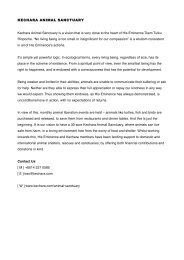
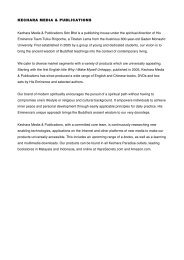

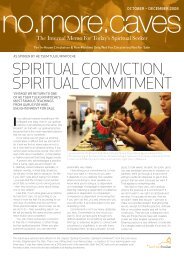

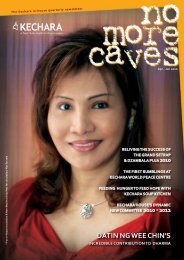
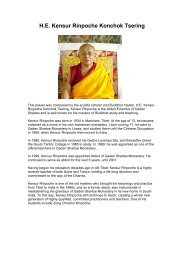


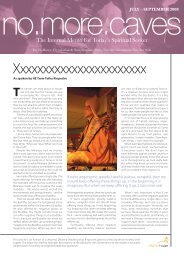
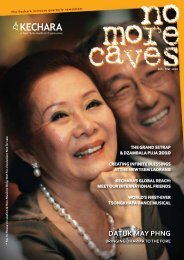


![7_NMC - OctDec09 [28Oct09] lowres.pdf - Kechara](https://img.yumpu.com/23793597/1/184x260/7-nmc-octdec09-28oct09-lowrespdf-kechara.jpg?quality=85)